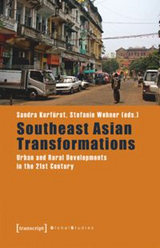
The moral space and the logic of collective self-organisation of domestic workers in Chennai, India
Vogel, Johanna / Eberhard RothfußExterne Publikationen (2020)
in: Sandra Kurfürst / Stefanie Wehner (eds.), Southeast Asian Transformations Urban and Rural Developments in the 21st Century, Bielefeld: Transcript, 91-108
ISBN: 3-8394-5171-X
DOI: https://doi.org/10.14361/9783839451717
Open access
Our overarching contribution in this chapter is the claim that a shared “moral topography” (Taylor, 1994) of lower classes can create forms of collective ‘consciousness’ which may lead to collective action. In order to establish that a shared moral topography is an incremental prerequisite for creating practical spaces for self-organisation, the chapter outlines Charles Taylor’s concept of morality, “moral topography”, “moral space and actions” as well as the concept of “identity”. Empirical data show that the moral topography of domestic workers in Chennai (Tamil Nadu, India) is characterized by a shared meaning and collective experiences of injustice. Further empirical evidence demonstrates that due to this common understanding of injustice, domestic workers in Chennai start organising themselves informally and establishing trade unions. Through self-organisation, domestic workers meet a demand for social security which the state fails to provide.

